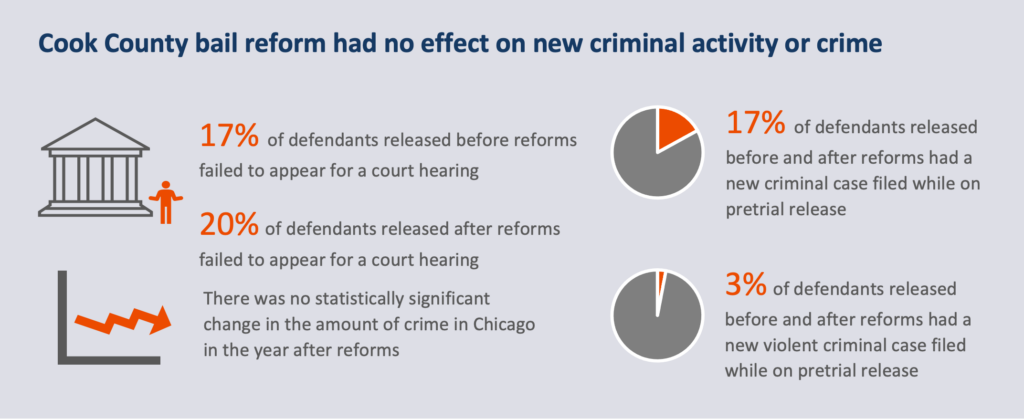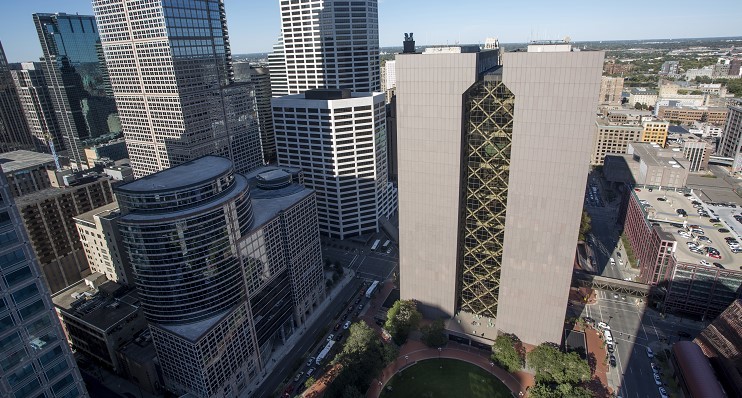Bail Data Analysis Pretrial and Bail September 18, 2023
The justice system in MacArthur’s home state of Illinois is set to become more just, equitable, and fair without increasing crime, thanks to the Pretrial Fairness Act. While many people and organizations worked towards this landmark reform bill for years, MacArthur’s Safety and Justice Challenge (SJC) helped support non-partisan analysis and research and education around key parts of the bill.
The Pretrial Fairness Act makes a range of reforms to the criminal justice system in Illinois. One of the most significant changes is eliminating cash bail and redesigning the pretrial process and decision-making. Illinois is the first state in the nation to ban cash bail entirely.
The end of cash bail in Illinois, which goes into effect September 18, 2023, will reduce the discriminatory impact of the justice system in the state. In the past, cash bail left people in jail who could not afford to pay bond, while those with greater access to resources were released and able to return to their families, jobs, and homes.
Under the new system, people are released from jail unless the State’s Attorney initiates a petition for detention, based on the risk of a defendant committing another crime or fleeing prosecution. When this occurs, a hearing is held, evidence of risk to the community is presented and evaluated, and the judge determines if pretrial release will be granted. By removing the role of money and wealth from pretrial release, the Pretrial Fairness Act will promote greater equity and fairness, particularly for people with lower income and members of historically marginalized communities in Illinois.
Analyzing the Impact of Local Reforms
While support for ending cash bail had been building for a while, some important steps happened in Cook County under their MacArthur SJC grant. The Cook County’s Office of the Chief Judge issued a general order in 2017, designed to increase pretrial release without cash bail and increase the affordability of cash bail when used as a condition of release. The chief judge received collaborative support and buy-in from other system and community stakeholders to implement these changes.
And, because SJC prioritizes data transparency and analysis, the Office of the Chief Judge shared their data with another MacArthur grantee for analysis: Loyola University of Chicago’s Center for Criminal Justice.
Loyola deserves credit for its efforts to educate journalists, government officials, and the public about how bail reform impacts community safety. Their analysis of bail reform in Cook County since 2017 traced people who had been released pretrial. What they found was invaluable to the debate around bail reform in the Pretrial Fairness Act: they learned that there was no change in the rate at which defendants were charged with new crimes in the six months or year following their release, even though the number of people released during this period increased.

Loyola’s Professors Don Stemen and David Olson concluded that Cook County’s decreased use of cash bail had no impact on new criminal activity or crime. Overall crime rates in Chicago, including violent crime rates, were not any higher after the implementation of bail reform. The analysis and findings in Cook County resembled other areas where similar bail reform efforts have been undertaken, such as New York, New Jersey, and Philadelphia.
The analysis also showed that releasing people while they await trial does not make communities less safe. Monetary bail, however, does impose a burden on the individuals and families who are least able to afford it. Like bail reform efforts in other communities, Cook County’s initiative demonstrated that it is possible to decrease the use of monetary bail and pretrial detention–lessening the financial, physical, and psychological harms that come with pretrial detention–without affecting criminal activity or crime rates.
Without Cook County modeling bail reform for the rest of Illinois and Loyola analyzing and sharing the results, Illinois may not have had the support to end cash bail statewide.
Implementing reforms at the local level, analyzing the results, and sharing learnings is at the heart of SJC as we try to encourage the spread of reform across the country. The Pretrial Fairness Act, a first-in-the nation law, took lessons from a local community and used it to inform smart reform decisions at the state level. This shows exactly the type of momentum the Safety and Justice Challenge was designed to push forward, and we know it will have a positive impact on people’s lives, even as there is more work to be done.


